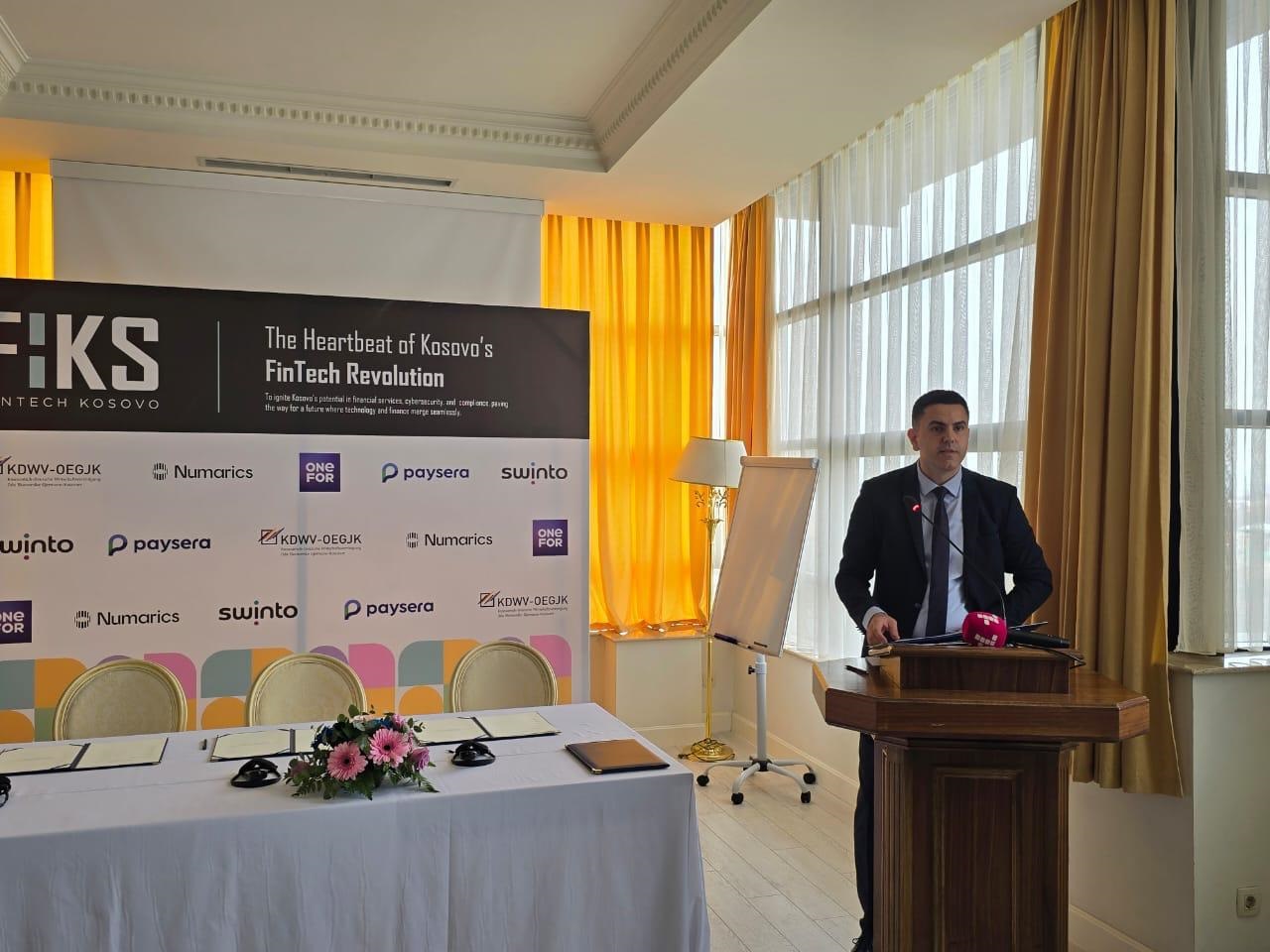The Central Bank of the Republic of Kosovo is in the process of advancing the regulatory and supervisory framework and infrastructure in the field of digital payment services and the FinTech sector, declared the Deputy Governor for Banking Operations, Mr. Dardan Fusha, at the inauguration ceremony of FinTech Kosovo (FIKS).
Deputy Governor Fusha emphasized in his welcoming speech that continuous digitization of financial services creates opportunities for more efficient, accessible, and inclusive financial services, thereby promoting the economic development of the country.
"The application of digital technology in the field of financial services, or as known as FinTech, is making significant changes in the form and manner of providing financial services, processes that accelerated during the COVID-19 pandemic situation," highlighted Deputy Governor Fusha.
"The FinTech sector has undergone extraordinary growth in recent years, changing traditional payment systems and banking in many countries. In Kosovo, so far, four non-bank financial institutions have been licensed in the field of digital payments, and three existing institutions have expanded their activities, as a result of regulatory changes based on EU standards, to enable the operation of FinTechs and innovative services in the local market," added Deputy Governor Fusha.
According to Deputy Governor Fusha, in recent years, the FinTech ecosystem has experienced significant expansion in the Republic of Kosovo.
"The FinTech ecosystem in the Republic of Kosovo has expanded in the last 2-3 years, enabling the attraction of investments for local and foreign companies, mainly in payment services and small international transfers, including remittances. The CBK has shown readiness to advance in building a friendly environment for developments and innovation, where many FinTechs see it as an opportunity to expand into the Western Balkans market," emphasized Deputy Governor Fusha.
Deputy Governor for Banking Operations added that the financial system of the Republic of Kosovo is undergoing rapid changes in innovation and migration towards digital payments and services.
"The CBK, as a regulator but also a catalyst, is determined to expand opportunities and adapt international best practices and rules that enable the provision of new digital services for businesses and consumers. Financial services enabled by these technological developments are continuously increasing by banks, but also by FinTechs and new non-bank financial institutions," explained the Deputy Governor for Banking Operations at the CBK.
However, Deputy Governor Fusha highlighted that these benefits must be carefully weighed against new risks arising from entirely digital service providers, especially the risk of cyber-attacks and misuse of data.
In this direction, financial institutions licensed by the CBK, in function of advancing the payment system and improving the quality and efficiency of payment services for their clients, are encouraged to:
- Invest in infrastructure and raise human capacity;
- Advance policies, procedures, and risk management processes to ensure business continuity, as well as the confidentiality and integrity of information when contracting services from external parties;
- Address cyber risks through close collaboration with the CBK and state authorities responsible for cybersecurity at the national level; and
- Pay attention to external ownership and the origins of client and potential investor funds, through screening mechanisms, taking into account current geopolitical risks.
Regarding projects aimed at improving services for citizens, Deputy Governor Fusha emphasized that the CBK is in the process of investing in infrastructure and human resources capacity building. Additionally, the CBK is committed to:
- Developing and creating opportunities for access to the payment system for non-bank service providers, to increase competitiveness after enabling the possession of IBAN, to increase access to finance, under the new concept of "payment account";
- Developing technical infrastructure to enable fast payments 24/7, creating a national QR Code, and standardizing APIs for system interconnection;
- Advancing the regulatory and supervisory framework for anti-money laundering and counter-terrorism financing in relation to payment services and transfers; and
- Strengthening the National Payment Council at the country level, where a meeting was recently held with the expanded membership of the council, including representatives of NBFIAs.
"These developments will strengthen the supervision of FinTechs, for which the CBK has established a separate function for supervising information systems and cyber risk for financial institutions, a function for supervising service offering practices by financial institutions, as well as strengthening financial education, as a means of treating the demands arising from such services correctly and fairly," emphasized Deputy Governor Fusha.
Finally, Deputy Governor Fusha encouraged financial institutions licensed by the CBK, in function of advancing the payment system and improving the quality and efficiency of payment services for their clients, to increase cooperation with a focus on creating interoperability between their systems and services, as well as harmonizing and standardizing the way of communicating and exchanging financial data and messages.

0 comments